The vastness of the Universe humbles my curious mind. Imagine a solar system somewhere in the shadows of the Universe that includes a bright blue planet covered with oceans of water. Unlike the barren inner planets scorched by heat from the Sun, or the bitter cold outer planets where seas of liquid nitrogen break on icy shorelines, the blue planet boasts a balmy climate. It is modest in size: large enough to induce sufficient gravitational force to develop an atmosphere, yet not so large gravity has crushing strength. The atmosphere is rich in nitrogen, carbon dioxide, and oxygen, and protects the blue planet from the relentless bombardment of meteors that riddle other planets. Poisonous ammonia and methane gases common to many planets are nearly absent. A magnetic field and a cocoon of ozone protect this goldilocks planet from cosmic radiation, and a large moon stabilizes its spin.
Given enough time, I suppose such a planet could spontaneously form simple organic compounds from atmospheric fluids. In billions of years, it's conceivable some compounds in this 'organic soup' could become complex enough to grow and diversify. It's difficult to imagine these compounds becoming so complex they develop into discrete creatures that move, eat, and reproduce. With a billion more years of evolution, try to envision intelligent creatures roaming the exploiting the blue planet.
As I sit here in the Columbia River Gorge listening to Mozart from my car stereo, I am mystified by my own existence. I try to visualize the enormous force of the Missoula Flood the raged through the Gorge 10,000 years ago to carve this spectacular canyon. Geologists argue that Missoula Lake formed behind a glacial dam during the waning years of the Ice Age. As the continental glaciers melted, the lake became immense and its waters rose so high the ice dam 'floated' and ruptured. Floodwaters rushed westward, devastating much of Idaho and eastern Washington before funneling through and carving the Columbia River Gorge. The theories are logical, yet inconceivable.
And on this winter day, relentless winds howl through the Gorge as gnarled fir trees desperately cling to the basalt cliffs. Magnificent waterfalls cascade from hanging valleys to the floor of the recently incised Gorge. I have admired the specter and pondered its origin, but ask now what difference it makes. This canyon in all its glory is but a passing blemish in the infinite history of the Earth and Universe. Why I am here to witness the marvel baffles me. But witness I do, awe stricken.
How many times has this planet spun about its axis since assuming its orbit five billion years ago? Day then night then day again, round and round. Geophysicists argue the angular velocity of the Earth is decreasing with time due to the frictional resistance from ocean and Earth tides. Evidence exists from the fossil record that there were 400 days per year 300 million years ago. I suppose it would not be difficult to calculate when there will be only 200 days per year, or when (like its moon) the Earth stops spinning completely.
In my reality, there are 365 days per year and this day is passing into night. Flying west in a jet plane at 500 miles per hour, the sunset lingers for an hour. The Sun sets over the Wasatch Mountains, then the Great Salt Lake, and now over southern Idaho. The clouds form countless patterns of symmetry and sometimes are indistinguishable from the snow-covered mountains below them.
Now is a time to be introspective. What have I accomplished these past few days? Am I happier or more peaceful? What contributions have I made to society and science? Am I any closer to solving the riddle of life? Time slips past exponentially. The plane will land and the Sun will rise and the seasons will pass. The old will die and babies will grow. In the frenzy of a day's work, my mind is occupied with the gibberish of civilization. But as the Sun sets, I reflect on how much this day resembles so many before it.
This day has slipped into night and darkness now envelopes the Earth. Distant stars twinkle events that occurred millions of years before curious Earthlings gazed at them in astonishment. Clever astronomers study these timeless spots of light, searching for clues of their own existence. Huge reflecting telescopes on remote mountain peaks probe deep into the Universe. Mighty arrays of dish antennas listen to electromagnetic waves from distant
galaxies, hoping a meaningful clue might be mixed in with the noise. Soon the Hubble orbiting telescope will peer an order of magnitude deeper into the Universe in search of its limits, if they exist. Generation after generation, scholars explore the unknown realms of mind and matter in search of the Rosetta Stone of existence.
Wind in my hair and whistling spokes are the only sound in the serene mountain air. I feel as free as a bird and young as a child as I race my bike up the twisting canyon road. At first, my mind is burdened by the unpleasant thoughts I strive to leave behind. But as I race up the steep mountain road, I become intoxicated by exhaustion and free of burdensome thoughts. Pedaling through the 'narrows' and up the 'wall', I check my time and compare it to the last 100 times I rode up Golden Gate Canyon. A head wind is hindering my time today. Rather than concern myself with my sluggish ascent, I look forward to the tail wind on a thrilling descent.
“I really had a raw deal at work yesterday.” Is that me thinking? How did such an offensive thought slip past my defenses? Only one thing to do: shift to my 18-tooth, climb out of the saddle, and sprint to exhaustion. Ah, yes, that feels better. Obviously I'm not riding hard enough or I wouldn't have to go through this thought-purging exercise.
The wind stops blowing and I sip some water. The first summit is three miles ahead, so I pick up my pace in attempt to trim time lost to the head wind below. My heart is pounding and I'm panting in rhythm to my pedals. The smell and color of the pines subconsciously mesmerize me.
“I believe I see another rider up ahead; I need to catch him." Why is it that I'm never satisfied simply racing against myself? I've always been competitive at everything, and cycling is no exception. So I dig deeper for the reserve of stamina I keep tucked away for such occasions. The sun is high and my body perspires profusely to cool itself. My sunglasses begin to fog, so I take them off and pedal harder. I'm slowly catching the rider, but apparently he noticed my pursuit and picked up his pace.
Guy Summit is near and it doesn't appear I can catch the rider before cresting the hill. No matter, my time looks good considering the head wind down the canyon. “Is the rider Mark? Yes, I believe it is; no wonder I couldn't catch him." I've ridden countless miles with Mark through every canyon along the Front Range. He's a fine rider and will not be overtaken without a fight. But a three-mile descent lies just ahead and I can usually beat him downhill.
Cresting the hill, I tuck into a ball and shift to my 12-tooth. High-speed descents on winding mountain roads are pure euphoria. I'm 16-years old now and the world is my toy. I'm Superman and Einstein and my bike is greased lightning. “Problems” are a foreign concept. Lean to the left, then right, then left again: 40-miles per hour, now 47. A tight turn ahead with gravel … damn. I'm on him now and he knows it.
All my life I've been nicknamed “Wild Bill”. I suppose my nerve and temperament make a unique combination that set me apart. Mark knows I have more guts than him on fast descents, and I've closed the gap between us. I pull into his draft and greet him, at 50-miles per hour. Launched by his draft, I pass him and he immediately pulls into my draft. It doesn't get much better than this.
“There's a car ahead, let's chase it down”, Mark says. Taking turns breaking wind and drafting, we're in wild pursuit. Rather than the two individuals we were a few minutes earlier, now we're a polished team with a common goal. Unfortunately, the hill ends before we catch the car, but we enjoyed the chase.
We downshift, stretch our bodies, and prepare for the four-mile climb up the next summit. I comment about the delightful weather and invigorating ride. Then Mark says, “There must be bikes in heaven.” To which I respond, “Bikes are heaven.”
1925 - 2015 | Obituary
ROBERT CONNELLY December 18, 1925 to April 12, 2015.
Robert Frederick "Bob" Connelly was a unique man, the sort of person one seldom meets and never forgets. He began his life in Los Angeles, born to Frank and Helene (nee Hopkins) Connelly in 1925. He passed away in his home 89 years later, in Henderson, due to natural causes. He is survived by his wife, Pat Graeff; and his daughter and sons, Starr, Robert, William, Duane, Neil and Tim. Bob thought of himself as a patriarch, father, grandfather, great-grandfather, chemist, Christian, Freemason, and certified master gardener. Bob began his work life as a young boy, delivering newspapers in west Los Angeles. From then until the day he died, he relished a life of working and learning. As a young man, he served in the U.S. Army Air Corps during World War II. At the age of 18, he married Beverly Ann Butte and they had two boys, Bobby and Billy, before being honorably discharged from the military. After the war, Bob attended Caltech, where he earned a BS in chemistry. Even with the distractions of a growing family, he maintained grades near the top of his class. He worked for Shell, then Emery Industries as a lubrication engineer. During these years, Bob's family grew with the arrivals of Starr, Duane, Neil and Tim. After leaving Emery, Bob was an entrepreneur with many endeavors, which ultimately took him to Japan, where he lived from 1971 to 2000. After leaving Japan, he lived in Tustin, Calif., then Henderson. He was married six times and cherished the memories of all his wives. Bob was blessed with keen intellect, fantastic memory, ambition and an unending sense of humor. If he were here today, I'm certain he could tell you about the weather on my third trip to Tokyo in 1991. He had many favorite quotes, and here are two of them, "Measure thrice, cut once," and "When you come to a fork in the road, take it." He was active in many organizations including the church, Masons, master gardeners, Shriners, ICANN, American Chamber of Commerce of Japan and Caltech Alumni. The Robert F. Connelly funeral is scheduled for 4:30 p.m. Saturday, April 18, at Christ Episcopalian Church, 2000 S. Maryland Parkway, Las Vegas, NV. The Scottish Rite will participate in the funeral.
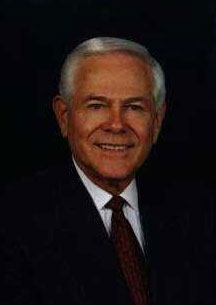
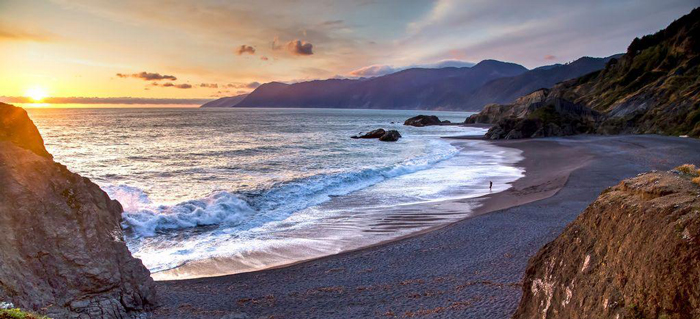
Footprints in Time (2019)
As we wonder on the damp sand by the sea, our footprints leave a meandering trail behind us. The tide turns, and with a single wave, all evidence of our journey is washed away. The damp sand now is a blank canvas for future beachcombers. So many have wondered hither and thither, and so many will wander long after we're gone.
Few will have their footprints preserved for future civilizations to discover. Two million-year-old footprints in Olduvai Gorge are the first evidence of humans trekking the globe. These early humans were concerned with survival and cared not if their footprints survived time.
As humans evolved and migrated, the desire to memorialize our fleeting existence grew. Ancient graves, monuments, pictographs, and petroglyphs show that people sought to leave evidence they passed this way. With time, there were pyramids and statues, then paintings and palaces. Like the Mayans and the Egyptians before them, some built structures as testament they were here. Grand estates give a sense of immortality. Owners eventually come to realize they are but stewards of the land. Their glorious estates stand proud long after they've returned to dust. But how good do these relics memorialize one's existence? What do they tell of intellect, compassion, strength, or vision?
With the invention of written language by the ancient Greeks came the ability to capture the essence of mankind in a form that could seemingly survive time. Homer's stories of The Iliad and The Odyssey were written more than 800 years B.C. about events that occurred some 1250 years B.C. Since those first epic poems, countless stories, science, and history have been captured in literature as footprints in time. Those unwilling to scribe their thoughts to posterity find easier ways to be remembered. Graffiti on subway walls and boxcars suffice for some who seek literary immortality.
But are our monuments and memorials, literature and graffiti, any better evidence of our fleeting existence than those nameless footprints in Olduvai Gorge ?
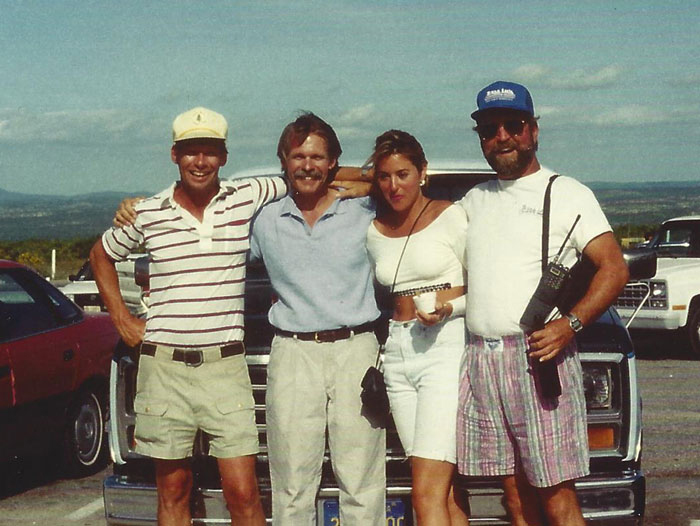
Glenn Gray, Bill Connelly, Gerald Ginn, Baja California, 1991
Wilder than Me (2019)
It was my intention to read you a yet unwritten story titled Wilder than Me, that shares many of my early life experiences with Gerald Ginn. I decided instead to just talk about some high points from this imaginary story. All my life I've been nicknamed "Wild Bill". In High School, the Navy, college, grad school, and at many jobs; friends independently gave me that nickname. So as a bit of an authority on "wildness", it's my conclusion that Gerald was Wilder than Me.
I met Gerald in 2nd grade in Temple City California. We lived in the same neighborhood, went to the same school, attended the same church, joined the same Scout troops, and had similar outlooks on life. Gerald was fun, smart, funny, and quite unconventional. Whenever Gerald or I got into trouble with authorities, we always were together, never alone. At times this became a problem and our parents discouraged us from hanging out together. Our friendship took us through the Scouts, selling newspapers at the horse race track, collecting snakes all through the southwest, to college, Vietnam, and so much more.
Gerald had an unusual sense of humor and, like Yogi Berra, had numerous memorable quotes. Some of Yogi's quotes might as well have been written by Gerald, notably:
- "Always go to people's funerals, otherwise they won't come to yours".
- And especially, "When you come to a fork in the road, take it".
With Gerald, there was no such thing as an "end of the road": there always was excitement and adventure to be found. Here are 3 'Geraldisms' I'd like to share with you. For decades, I've shared these with my family and friends, and are Gerald originals.
- "I'd rather owe it to you than cheat you out of it".
- "It'll feel better when it stops hurting".
- "It's so nice out I think I'll leave it out all day".
Gerald and I played acoustic guitars together during and after high school. We enjoyed folk music which was popular in the '60's. There were many tunes we taught ourselves, but the ones that come to mind as favorites were A Soalin' and Puff the Magic Dragon, both by 'Peter, Paul, and Mary'; and Norwegian Wood, by 'The Beetles'. I considered playing these tunes here today in memory of Gerald, but came to my senses and decided against it (I never play in public). Yes, at this late time in my life, I continue to play the same tunes Gerald and I played together 5 decades ago. We often played these as a duet where he played the harmony and sang while I finger picked. I recall once Gerald was enthusiastically singing and his front denture inadvertently came out of his mouth and landed in the hole of his guitar. I still can see him with a large gap in his teeth, shaking his guitar upside down trying to get his denture out, all the time laughing at himself.
So many stories I could share:
- Like when we ditched church and got arrested for causing mischief.
- Or when we rode our bicycles several hours to the beach with a bottle of Calvert's rolled in the middle of a sleeping bag; and sleeping in yachts parked in used boat yards. I recall riding through Rose Hills past a 45mph speed limit sign and Gerald saying "we can ride faster now".
- I recall numerous week-long snake-hunting expeditions in the desert; sneaking into motel swimming pools late at night with a bar of soap to bath.
- Or buying beer underage with hand-crafted false IDs.
Going to drive-in theaters with a trunk full of friends and beer.
- Hiking up Fish Canyon and camping in Birdbrain Thompson's subsistence cabin.
- Having the police come to my house after a station wagon of nuns reported that someone in my old Plymoth hung them a BA (I said it couldn't have been me since I was driving; it was Gerald).
- Many stories about our periodic road trips to Ensenada and Tijuana with dune buggies.
- I remember joining the Navy on a whim and going to Vietnam.
- And finally, I recall an epic drive down Baja to Cabo.
That drive down Baja with Gerald and Glenn took a week and was full of fun and adventure. It was 1991 and this was my last adventure with Gerald. After sharing 25 years as friends, we'd come to a fork in the road: he went one direction and I went the other. At the urging of one of his friends, Gerald became a real estate salesman for Century21 and, after only a 3 years, became their number 3 salesman in California. He always had a silver tongue and could sell anything. I became a geologist and worked all over the world.
But in the end, Gerald was Wilder than Me.
The loss of friends and family becomes more frequent as the years pass.
The most recent was Gerald Ginn in January 2019: May he Rest in Peace.
Wilder than Me was read at Gerald's memorial April 13, 2019.
Some memories of Gerald can be found in chapters "The Teens" & "Vietnam"
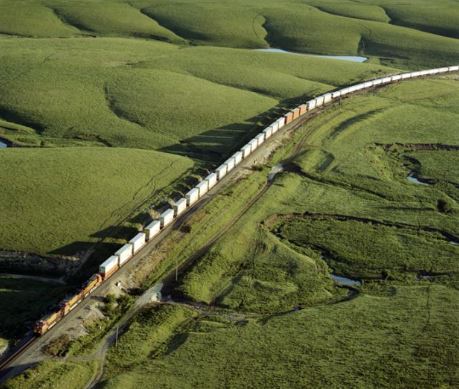
Just Passing Through (2019)
The West Pacific wasn't in his travel plans. Facts be known, he had no travel plans, or plans of any sort. Perhaps that's why his student deferment lapsed and was issued a 1A draft card. It was 1967 when he was conscripted to the US Navy on the USS Oriskany in the Gulf of Tonkin for two years of sea duty.
When finally there were only six months remaining in his hitch, he made his first "Short Timer's Chain". After 18 months of being crammed on an aircraft carrier floating near Vietnam, finally there was hope. No more bland food, endless long watch hours, retarded Chiefs, lack of privacy, and stupid white hats: freedom seemed achievably near.
A key chain has seven beads per inch. A tradition in the Navy is that a proper short timer's chain has one bead for each remaining day of active duty. So with 182 days remaining, his chain was some 4.3 feet long. Each day, as tradition dictates, he clipped one bead from the chain and threw it at someone he disliked. This was a morning ritual that continued each day until that final day when he gleefully strolled across the Quarter Deck and down the gangplank for the last time.
And during those final months he developed a "short timer's attitude". Some call this a "give-a-shit" attitude, but that seemed a bit crass for him. Navy routines started to seem less important now. The Petty Officer's harsh and crude words didn't seem to penetrate as they once did. The 'whites' weren't ironed as wrinkle-free, and the shoes didn't shine as before. The hair was longer and the shaves less frequent. His smile even changed and started looking like one you might see on a hippie walking the San Francisco sidewalks. Yes, his life seemed easier now and he came to be known as the Mellow Fellow as he skated through those last few months.
With his Honorable Discharge and college degree, he joined the ranks of working America. He worked diligently and moved up in his profession as the years sped by. Two, then three, then four weeks of annual vacation. A wife, and one, then two, now three children. Nicer cars, bigger houses, more travel; as he sped through life like a freight train passing through Kansas. But then came the gray hair, then thin hair, now bald. The kid's graduations, then weddings; grandchildren soon followed.
The days of gainful employment were coming to an end as the industry again struggled. It had struggled and survived several times in his earlier years; when only the older workforce was terminated. But this time it seemed he was one of those 'older' workers. His days were numbered and he knew it. With time, he slid into the short timer's attitude remembered from decades earlier with Uncle Sam. Evaluations became a joke. When asked, "Thinking of the course of your career, where would you like to see yourself in five years?" His trite answer was, "Hopefully above ground". Facial hair grew longer, more wash-and-wear shirts, and lots of long lunches.
Forced retirement came about the time Social Security and Medicare started. With time on his hands, politics took on greater importance. He tuned in the news regularly and read opinion articles, and never missed voting. As the years continued to pass, politics went through numerous good and bad cycles. It occurred to him the cyclicity would continue with or without him.
More and more time was spent with his grandchildren, home projects, and marijuana garden; politics became a distraction. The hair continued to grow and there were precious few ironed garments. It seemed it was time to make another short-timers chain, but he had no notion of the correct length.
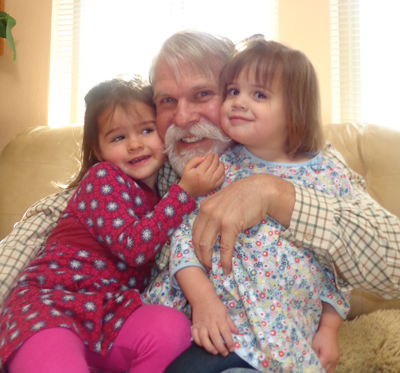
Cassia, Bill, and Ila.
"... He sped through life like a freight train passing through Kansas."
This is an interesting metaphor. One perception is that of the engineer as the train speeds through the baron grasslands, roaring and vibrating. But the perception of a bystander as the train roars past is quite different. It's quiet and peaceful, then the enormous presence of the freight train speeding through, then quite again for a long time until another nameless train roars through.